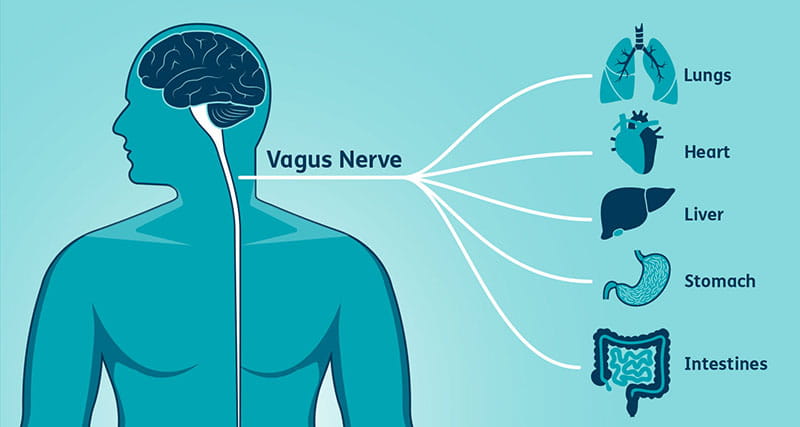Blog article
What is the vagus nerve and can we stimulate it for better mental health?

Researchers are continuing to explore the impact that stimulating the vagus nerve could have on a person’s mental health, with some psychologists and health specialists particularly excited by the potential connection. It’s time to meet (and applaud) the vagus nerve.
In this article
- What is the vagus nerve?
- What does the vagus nerve do?
- A vagus nerve breathing exercise
- Other methods that might stimulate the vagus nerve
- Psychology to help manage stress
What is the vagus nerve?
Pronounced vay-gus, the vagus nerve is an essential part of the parasympathetic nervous system – and the longest cranial nerve in the body.1
It stretches from your brainstem to your digestive system and is made up of thousands of fibres that constantly give your brain updates about your organs.

It’s not just its length that makes it intriguing though. There is evidence of scientists studying the vagus nerve in the late 1800s, investigating whether stimulating it could be a potential treatment for epilepsy. They later discovered that a side effect of activating the nerve was an improvement in mood.1
A theory that is currently being explored is that stimulating the vagus nerve could lead to:
- Reduced stress;
- Greater personal connections; and
- Better physical health.3
What does the vagus nerve do?
Here’s a look at some of the to-do list of the vagus nerve 2:
- Relaxes tension.The vagus nerve counteracts activity of the sympathetic nervous system, down-regulating our response to stress, curbing our physiologic state of alarm by moving us into a state of calm – often experienced as a ‘state of safety’.
- Oversees digestion - and is a main channel of connection between the brain and the gastrointestinal tract. The vagus nerve sends signals to the brain based on the actions of our gut bacteria – which is influenced by specific types of food. Here lays the ‘digest’ element to the vagus nerves duty to help us ‘rest and digest’.
- Influences inflammation. The stress response actually activates our immune system – and if stress is prolonged it can inflict damage on our organs. By playing a role in stress and its relief, the vagus nerve can help prevent inflammation.
Basically, stimulating the vagus nerve could potentially help us calm down, rest, and digest.
Dr Nadia Mertens is an accredited Osteopath, working from her clinic, Sana Osteopathy, in North Perth, Western Australia. With a bachelor’s in science and clinical sciences and a master’s in health sciences and osteopathy - she has become a passionate advocate for knowing how to stimulate the vagus nerve.
We asked Nadia to explain the vagus nerve and its connection to stress.
“The body’s stress response results from the activation of the sympathetic nervous system and is essentially the same regardless of the cause. It merely varies in intensity, duration, how easily it is activated. Being a parasympathetic nerve that influences many body functions, the vagus nerve helps dampen this response.”
A breathing exercise to potentially stimulate the vagus nerve and in turn - reduce stress
While the most common form of vagus nerve stimulation is electro stimulation (as in the case for treatment for uncontrolled epilepsy) there is some research suggesting activities like paced breathing may influence brain activity associated with stimulation of the nerve arising from the diaphragm.
We asked qualified Psychotherapist Laura Duggan of Northside Gestalt Therapy to share a breathing exercise aimed at stimulating, or “lighting up” the vagus nerve:
It’s all about extending the exhale to be longer than your inhale, and noticing how you feel before and after.
Close your eyes.
Notice your breathing.
Start to lengthen your inhale all the way down into your belly
(letting that vagus nerve feel that breath.)
Now lengthen the exhale too, making it longer than your inhale.
At the top of the next deep, belly inhale, pause and hold for 3. 2. 1.
Slowly and deeply exhale, again longer than your inhale.Repeat for 10 rounds.
Notice how you feel.
Other methods to potentially stimulate your vagus nerve
Through understanding that numerous forms of paced breathing can impact brain electrical activity, and that this might be mediated by vagus nerve stimulation arising from the diaphragm we can look at other methods of stimulation.
Some of the positive emotional and cognitive benefits we experience through deep breathing, yoga, or aerobic exercise activities could be attributed to cardio-respiratory stimulation of the vagus nerve.
Laura also suggests some other methods, to combine regularly, and assist in managing the stress response and possibly stimulating the vagus nerve:
- Deep tissue massage
- Yoga
- Heat therapy (sauna)
- Cold exposure (ice baths)
- Swimming
- Gym and cardio workouts
- Time in nature and sunshine
- Singing and 'omming'
- Gargling (loudly!)
While vagus nerve stimulation could be seen as a ‘health hack’ and has indeed been reported this way recently, it’s important to understand this is ongoing research, and the specific techniques mentioned are commonly recognised as relaxation exercises, rather than vagus nerve stimulating exercises. Learning to respond to stress, rather than react, is something we should see the benefit in prioritising, which is what makes the connection between the vagus nerve and mental health so fascinating.
Psychology to help manage stress
Speaking to someone is a selfless act for your mental health. Therapy is part of a toolkit that can help you learn how to respond to stress, rather than react, and many psychologists can further discuss different techniques to help find what works for you.
1 Medical News Today - Vagus Nerve Stimulation
2 Psychology Today - Vagus Nerve
3 National Library of Medicine - Vagus Nerve Stimulation
This article contains general information only and does not take into account the health, personal situation or needs of any person. In conjunction with your GP or treating health care professional, please consider whether the information is suitable for you and your personal circumstances.



